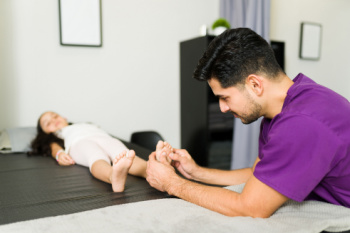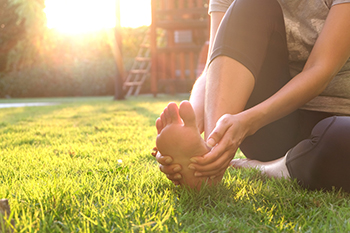283 St Rose Ave
Windsor, ON N8S 1X1

Heel pain is a common complaint in active children, especially those involved in sports. One of the most frequent causes is plantar fasciitis, which involves irritation of the thick band of tissue that supports the arch and connects the heel to the toes. In children, this pain often appears first thing in the morning or after long periods of inactivity, then eases with movement. Poor footwear, tight calf muscles, or high activity levels can place extra strain on the heel. While plantar fasciitis is usually manageable with stretching, rest, and supportive shoes, conditions like growth plate inflammation may also need to be considered. Persistent heel pain should not be overlooked. If your child starts limping or complaining of discomfort in the heel, it is suggested that you see a podiatrist to identify the cause and begin appropriate care.
Plantar fasciitis is a common foot condition that is often caused by a strain injury. If you are experiencing heel pain or symptoms of plantar fasciitis, contact the practitioners from Foot Care Institute. Our practitioners can provide the care you need to keep you pain-free and on your feet.
What Is Plantar Fasciitis?
Plantar fasciitis is one of the most common causes of heel pain. The plantar fascia is a ligament that connects your heel to the front of your foot. When this ligament becomes inflamed, plantar fasciitis is the result. If you have plantar fasciitis you will have a stabbing pain that usually occurs with your first steps in the morning. As the day progresses and you walk around more, this pain will start to disappear, but it will return after long periods of standing or sitting.
What Causes Plantar Fasciitis?
- Excessive running
- Having high arches in your feet
- Other foot issues such as flat feet
- Pregnancy (due to the sudden weight gain)
- Being on your feet very often
There are some risk factors that may make you more likely to develop plantar fasciitis compared to others. The condition most commonly affects adults between the ages of 40 and 60. It also tends to affect people who are obese because the extra pounds result in extra stress being placed on the plantar fascia.
Prevention
- Take good care of your feet – Wear shoes that have good arch support and heel cushioning.
- Maintain a healthy weight
- If you are a runner, alternate running with other sports that won’t cause heel pain
There are a variety of treatment options available for plantar fasciitis along with the pain that accompanies it. Additionally, physical therapy is a very important component in the treatment process. It is important that you meet with your podiatrist to determine which treatment option is best for you.
If you have any questions, please feel free to contact our office located in Windsor, ON . We offer the newest diagnostic and treatment technologies for all your foot care needs.

Poor dorsiflexion, or limited upward movement of the foot toward the shin, can interfere with walking and increase strain on other joints. Poor dorsiflexion is often the result of tight calf muscles, especially the gastrocnemius and soleus, which can restrict ankle movement. Previous ankle injuries, such as sprains that did not heal fully, may also lead to scar tissue or stiffness, further limiting motion. In some cases, compression or injury of the deep peroneal nerve, which controls the muscles responsible for dorsiflexion, may prevent the foot from lifting properly. Ankle joint restrictions or structural limitations related to genetics may also play a role. When dorsiflexion is impaired, the body may adapt by altering gait, which can place excessive stress on the knees, hips, and lower back. A podiatrist can evaluate the ankle’s range of motion, identify the underlying cause of the restriction, and recommend medical treatment or surgery, if necessary. If you have problems flexing your foot, it is suggested that you schedule an appointment with a podiatrist for a diagnosis and appropriate treatment.
If you have any concerns about your feet, contact the practitioners from Foot Care Institute. Our practitioners can provide the care you need to keep you pain-free and on your feet.
Biomechanics in Podiatry
Podiatric biomechanics is a particular sector of specialty podiatry with licensed practitioners who are trained to diagnose and treat conditions affecting the foot, ankle and lower leg. Biomechanics deals with the forces that act against the body, causing an interference with the biological structures. It focuses on the movement of the ankle, the foot and the forces that interact with them.
A History of Biomechanics
- Biomechanics dates back to the BC era in Egypt where evidence of professional foot care has been recorded.
- In 1974, biomechanics gained a higher profile from the studies of Merton Root, who claimed that by changing or controlling the forces between the ankle and the foot, corrections or conditions could be implemented to gain strength and coordination in the area.
Modern technological improvements are based on past theories and therapeutic processes that provide a better understanding of podiatric concepts for biomechanics. Computers can provide accurate information about the forces and patterns of the feet and lower legs.
Understanding biomechanics of the feet can help improve and eliminate pain, stopping further stress to the foot.
If you have any questions please feel free to contact our office located in Windsor, ON . We offer the newest diagnostic and treatment technologies for all your foot and ankle needs.

Wearing the right shoes is essential for restaurant workers who spend long hours on their feet in fast-paced and often slippery environments. Proper footwear provides the necessary support to reduce fatigue, prevent foot pain, and promote better posture throughout the day. Shoes designed with slip-resistant soles help prevent accidents on wet or greasy floors. Supportive shoes also help reduce the risk of long-term issues, such as plantar fasciitis, joint pain, and lower back discomfort. Breathable materials and cushioned insoles add comfort during extended shifts. Choosing footwear that fits well and meets safety standards is a simple but powerful way to enhance job performance and overall well-being. Investing in the right shoes reflects a commitment to health, safety, and productivity in the demanding restaurant industry. If you have foot conditions from wearing the wrong shoes during your workday, it is suggested that you contact a podiatrist who can treat various foot ailments, and guide you on appropriate shoes to wear during the day.
While working on the feet, it is important to take the proper care of them. For more information about working on your feet, contact the practitioners from Foot Care Institute. Our practitioners will treat your foot and ankle needs.
Working on Your Feet
Standing on your feet for long periods of time can cause stress and pain in your feet. Your whole body may experience change in terms of posture, back pain, bunions, callouses and or plantar warts. There are ways to avoid these conditions with proper foot care, smart choices and correct posture.
Positive Changes
Negative heeled shoe – Choosing this shoe type places the heel slightly lower than the ball of the foot. These are great for overall foot health. Find shoes that fit you correctly.
Go barefoot – Our feet were not designed to be enclosed for all hours of the day. Try to periodically expose your feet to air.
Eliminate Pain
Foot Exercises – Performing simple exercises, incorporating yoga and doing stretches are beneficial. This will allow increased blood flow to the area and muscles of the foot.
Achilles tendon – Stretching the foot out flat on the floor will relax the calf muscles and tendon. These exercises can be performed almost anywhere. Make sure you add these exercises to your daily regimen.
With a little bit of this information and knowing more about foot health, you will notice changes. Foot stretches and proper footwear will help with pain and prevent further issues.
If you have any questions please feel free to contact our office located in Windsor, ON . We offer the newest diagnostic and treatment technologies for all your foot and ankle needs.






